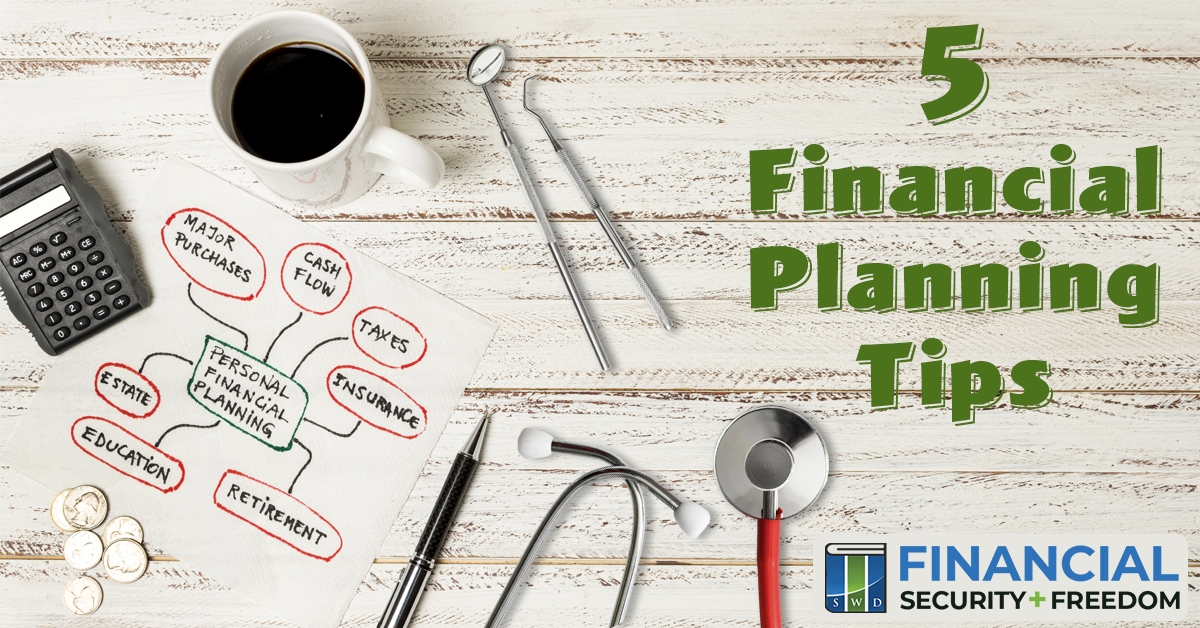
If you are a new physician or dentist, you may be overwhelmed by the number of financial decisions you need to make as you start your career. Physicians and dentists are unique as their income jumps significantly in a short period of time, and they are bombarded with decisions about their benefits, income, taxes, student loans, etc.
So, we’ve put together five financial planning tips for new physicians and dentists to help you start on the right financial footing and avoid overwhelm.
- Understand your Employment Contract
Before signing on the dotted line, make sure you understand all aspects of your employment contract.
It’ll include significant elements such as your salary and benefits, malpractice insurance rates, retirement accounts available, sick day policies, vacation days, and so on.
If there are some clauses or phrases you don’t fully comprehend, ask a senior colleague to explain them to you or seek professional advice before signing.
More importantly, look beyond the contract, salary, and benefits to the company itself. Is the culture and team environment a good fit for you? Is there future growth potential?
Before accepting the position, make sure you consider all aspects that pertain to your long-term job satisfaction and financial stability.
- Develop a Budget and Live Like a Resident for the First 3-5 Years
Your cash flow is the foundation on which you will be able to build your financial house. Therefore, it is essential to have a complete understanding of your cash flow – what comes in and what goes out.
The average salary for a physician is around $224,190, and the average salary for a dentist is $171,350. And the living expenses can vary dramatically depending on which state you work in.
We have seen many new physicians and dentists go out and buy their dream homes right away without calculating their budgets and the full impact on their cash flow. Instead, we recommend that our physician and dentist clients maintain a modest lifestyle for the first 3-5 years and live well within their means. As for a mortgage, we recommend you not spend more than 15-20% of your income on one.
If you have student loans, you should also consider which repayment program is best for you. For example, if you start with an Income-Driven Repayment Program, you may be in for a surprise as the payments may increase considerably based on your income.
By waiting to make significant purchases and gaining a good grasp on your cash flow early on, you can form the foundation that will allow you to build a solid financial house.
Want some help evaluating your cash flows and financial decisions? Consider working with a Certified Financial Planner. They can be an invaluable partner on your financial journey.
- Devise a Plan for Your Student Loans
From our experience, student loans are probably the #1 worry for new physicians and dentists.
Depending on your salary, it can be challenging to make student loan payments while saving money for other goals like retirement or a down payment on a home.
Steps to take:
- Figure out how much you’ll make per year (salary + benefits).
- If you have federal loans, evaluate your repayment options with this Loan Simulator from the Federal Student Aid office.
- Consider refinancing into a private loan if it makes sense for your situation.
- Create a monthly budget with the student loan repayment included.
- Work with a financial professional, like Strategic Wealth Design, who specializes in student loan debt and repayment strategies.
- Protect Your Income and Your Family with Disability Insurance
You have spent many years (and dollars) training for becoming a physician or a dentist. But, imagine, one day you cannot work due to a disability, sickness, or injury. What would happen to your income? Your cash flow? Your student loans?
Protecting your livelihood and income with Disability Insurance is vital for new physicians and dentists. It is even more critical when you have a family and others who depend on your income, such as a spouse, children, and parents.
Disability Insurance typically pays anywhere from 50% to 70% of your salary if you’re unable to work due to an injury or sickness. The coverage is generally available for short periods (less than six months) and long periods, typically until age 67.
The best way to figure out if you need Disability Insurance is to ask yourself:
How long would you and your family be able to survive without your income?
If the answer is a few months or less than a year, consider protecting your income with Disability Insurance.
The earlier you get Disability Insurance, the cheaper it will be per month. Also, if you’re young and healthy like most new physicians and dentists, it will be easier to qualify for the coverage.
Lastly, review your employment contracts and benefits through your employer; you may qualify for a group disability plan through work!
- Work with a Pro and Create a Financial Plan
Now that you have a real salary, your student loans are starting to be paid, and you have Disability Insurance in place, it’s time to create a Financial Plan.
Here are some straightforward Financial Planning tips to get you started:
1) Build at least 6-12 months of cash reserves in an “emergency fund” to cover unplanned expenditures like health insurance deductibles, car repairs, and appliance replacements.
2) Start funding retirement accounts and take advantage of any company-sponsored matching programs. Want to know more? Check out our article on Understanding the Different Types of Retirement Plans.
3) Save at least 15-20% of your monthly salary in various investment vehicles (tax-deferred, tax-free, and/or taxable).
4) Consider buying Life Insurance if you have dependents who rely on your income. Term Life Insurance is inexpensive and can provide valuable protection.
A qualified financial planner can help you create a Financial Plan to achieve your goals and create a roadmap to cover children’s education, your retirement, future investments, etc.
For more Financial Planning tips and information, check out our blog.
Conclusion
To have a successful life as a physician or dentist, you need to plan ahead and make wise decisions now to reap long-term benefits.
You also want to protect your family and income by considering Disability Insurance, Life Insurance, and building emergency savings accounts.
You need to make some important financial decisions, but there’s no need for overwhelm. Working with a qualified financial planner can make the process much easier and give you peace of mind knowing you are starting on the right financial footing.
Our Certified Financial Planners have been helping physicians and dentists manage their finances for over 20 years combined. We know what it takes to create a balance between your career ambitions and financial needs.
Get a FREE consultation with one of our expert CFPs to understand what matters most to you and create a personalized plan around those priorities.
